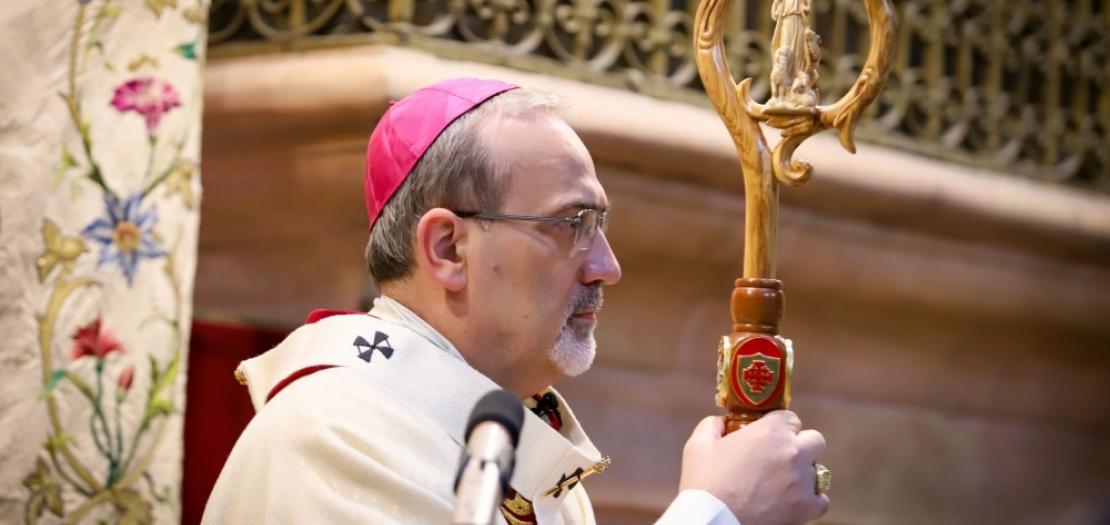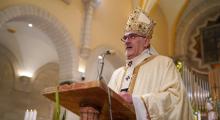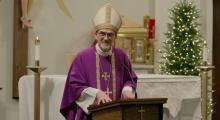Issued by the Catholic Center for Studies and Media - Jordan. Editor-in-chief Fr. Rif'at Bader - موقع أبونا abouna.org

Following is the text of the meditation by Latin Patriarch of Jerusalem His Beatitude Pierbattista Pizzaballa for the fifth Sunday of Easter, Year B, May 2, 2021:
Last Sunday we saw how the figure of the shepherd, in so far as Jesus identifies himself (Jn 10), has its roots in the Old Testament: Jesus fulfills the expectation of a good shepherd, who does not flee in the face of danger but stays and offers His life.
Even today we see again the same dynamic, through the image of the vineyard: the reference text to understand this image is Isaiah 5:1-7. The expectation, this time, is not by Israel, but by God: God expects a good vineyard that simply produces grapes. He planted a “valuable vine” on a “fertile hill”, he cleared the ground from the stones, he took care of it: but the vineyard produced only “sour grapes,” it did not produce any good fruit. This is the condition of humanity, which Jesus describes in a verse of today’s Gospel, when He says that without Him we can do nothing (Jn 15: 5).
By itself, in itself, a vineyard cannot produce fruit at the height of God’s expectation, because humanity cannot live a life that is true and beautiful, it does not possess eternal life in itself. The fruit does not depend on our efforts, our observances: however good it is, the fruit is still quite another thing.
What was missing, therefore, in the vine of which Isaiah speaks because the fruit was good? Did not God himself take care of it? In this vineyard Jesus was simply missing.
This is why the Lord speaks of himself precisely as the true vine (Jn 15:1), the one that finally bears the fruit that God expects, the one that finally is able to say to the Father a yes without reserve, the one that lives the life of the Father.
Of this life, Jesus opens the doors, so that it is the life of every man and each shares in it, just as a branch shares in the life of the vine.
Jesus emphasizes two particularities about this vineyard. The first is the experience of pruning: essential to producing fruit is to accept pruning: “Every branch that bears fruit He prunes it so that it may bear more fruit”(Jn 15:2).
It is interesting that the verb “to prune” in Greek has the same root of the term “pure”, which Jesus uses immediately after: “You are already pure”, that is, already pruned. To bear fruit it is necessary to keep the life of the vine within itself, without anything else.
Anything more, everything that is other than this, is simply eliminated, because the branch is nothing other than what it must be: part of the vine. The life of the disciple, therefore, is continually brought to its own importance, to the truth of what it is: to be pure means precisely this, to be simply oneself.
How does this purification happen, this pruning? Jesus affirms that it is His Word that performs this operation (Jn 15:3): whoever truly listens to it, abandons his gaze upon himself and others, and his heart becomes simple.
And the second characteristic regards what it means to be simply oneself: a branch is itself, it is true, when it remains in the vine. We simply need to remain, a verb that recurs at least seven times in today’s selected text: and this means that entry into new life is already given, it’s not sought or conquered by its own strength. One enters the new life by grace, by the gift of Baptism that imparts the sap, the life of God, joins us to the Church.
But it is up to us to remain there, not to lose ourselves looking for life elsewhere: Jesus says that whoever does not remain, is thrown away and “dried” (Jn 15:6), namely, dies.
Those who do not remain in God, those who live a self-referential life, those who are content with themselves, those who are satisfied, renounce life and fruitfulness, just like the grain of wheat we met on the 5thSunday of Lent: we have seen that life held tight, a life enclosed in itself and concentrated on itself, is a life that remains alone, that knows only the narrow spaces of its ego, and is destined to end.
But whoever remains, lives in a truly full way, the same life of God: with Him he shares the same feelings, the same way of feeling and thinking, the same gaze on things in life, the same love with which to love everyone. For this reason, he can ask anything (Jn 15:7), because he will ask only this new and risen life, a life of communion with God and with all others, all members of the same body.
+Pierbattista







